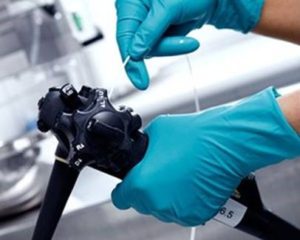 With endoscopes having been linked with so many superbug outbreaks in recent years, some may naturally wonder if they can play a role in the spread of Covid-19 as well. While there is no scientific research or published findings of a link between endoscopes and Covid-19, intuition tells us that endoscopes may play a role in potentially spreading the coronavirus under certain conditions.
With endoscopes having been linked with so many superbug outbreaks in recent years, some may naturally wonder if they can play a role in the spread of Covid-19 as well. While there is no scientific research or published findings of a link between endoscopes and Covid-19, intuition tells us that endoscopes may play a role in potentially spreading the coronavirus under certain conditions.
A recent letter published in Infection Control and Hospital Epidemiology by Cori Ofstead and Krystina Hopkins of Ofstead and Associates and Dr. Matthew Binniker and Dr. Gregory A. Poland of the Mayo Clinic shined the spotlight on potential scenarios under which endoscopes could play a role in the spread of Covid-19. As the letter explains:
“There is currently an urgent need to reduce the number of patients requiring hospitalization or intensive care, in part because of shortages of ventilators and personal protective equipment. Given the high bronchoscope contamination rates found during routine use in previous studies, we must now consider the possibility of bronchoscopy-associated transmission of COVID-19 or other pathogens that could cause secondary infections. Theoretically, high-level disinfection should eliminate these risks when bronchoscopes are well-maintained and reprocessed according to manufacturer instructions and professional guidelines. However, even during normal patient loads, practices are frequently substandard, and pathogens are commonly present on patient-ready endoscopes. The presence of gastrointestinal pathogens found in bronchoscopes and BAL samples suggests the possibility of cross-contamination caused by intermingling bronchoscopes and gastrointestinal endoscopes during reprocessing. This hypothesis is supported by findings at one hospital where protein and bioburden levels on brand-new bronchoscopes increased significantly following manual cleaning prior to any clinical use.
Researchers recently reported COVID-19 patients presenting with diarrhea and abdominal pain, with fecal carriage of SARS-CoV-2 among severely ill and asymptomatic patients. Thus, extreme care must be taken to minimize cross-contamination during all endoscope reprocessing.
Reprocessing effectiveness has not been evaluated in epidemic settings, and research is needed to confirm that COVID-19, influenza viruses, and other pathogens are eliminated in these settings. The use of sterile, disposable bronchoscopes would substantially reduce the risks for patients and reprocessing personnel, and this approach has been recommended by the American Association for Bronchology and Interventional Pulmonology. However, single-use bronchoscopes are not universally available and may not be sufficient for advanced bronchoscopy. When reusable bronchoscopes must be used, they should be segregated from gastrointestinal endoscopes and sterilized rather than relying on high-level disinfection.”
Read the entire letter here: Potential impact of contaminated bronchoscopes on novel coronavirus disease (COVID-19) patients
Some hospitals may be reluctant to sterilize endoscopes or use disposable endoscopes for many reasons, including cost and efficacy. As the letter points out, the infection risk with high-level disinfected endoscopes continues to be a major worry for patients and hospitals alike. Facilities must ensure staff are trained on general infection control principles and must adhere to reprocessing best practices, and they must be prepared to discuss the risks of endoscope-related procedures with their patients. To ensure that your staff is following reprocessing best practices on every scope they disinfect or sterilize, install additional checks and balances into your workflow so that you can document that your staff is following the same process each time. Software systems such as iRIScope have been introduced in recent years to help hospitals and surgery centers ensure that each of their flexible endoscopes is reprocessed the proper way each time, and documentation of their reprocessing is kept electronically using advanced RFID technology. These systems safeguard the scope disinfection process by employing artificial intelligence to determine if scopes are adequately reprocessed before their next use. With these systems in place, staff and patients can be more confident that their endoscope-related procedure won’t result in a life-threatening infection such as Covid-19.
